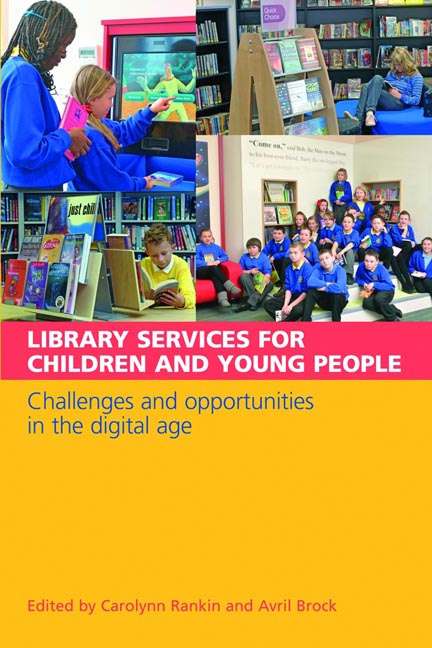Book contents
- Frontmatter
- Dedication
- Contents
- Contributors
- Foreword
- Acknowledgements
- Introduction and vision for the book
- Part 1 Children's library services – policy, people and partnerships
- 1 Library services for children and young people – an overview of current provision, future trends and challenges
- 2 21st-century school libraries – visionary spaces for learning
- 3 The changing shape of reading – the 21st-century challenge
- 4 Case study. Engaging and influencing policy and the curriculum – the Scottish Information Literacy Project experience
- Part 2 Connecting and engaging – reaching your audience and catching the latest wave
- Part 3 Buildings, design and spaces – libraries for children and young people
- Part 4 Issues for professional practice
- Index
4 - Case study. Engaging and influencing policy and the curriculum – the Scottish Information Literacy Project experience
from Part 1 - Children's library services – policy, people and partnerships
Published online by Cambridge University Press: 08 June 2018
- Frontmatter
- Dedication
- Contents
- Contributors
- Foreword
- Acknowledgements
- Introduction and vision for the book
- Part 1 Children's library services – policy, people and partnerships
- 1 Library services for children and young people – an overview of current provision, future trends and challenges
- 2 21st-century school libraries – visionary spaces for learning
- 3 The changing shape of reading – the 21st-century challenge
- 4 Case study. Engaging and influencing policy and the curriculum – the Scottish Information Literacy Project experience
- Part 2 Connecting and engaging – reaching your audience and catching the latest wave
- Part 3 Buildings, design and spaces – libraries for children and young people
- Part 4 Issues for professional practice
- Index
Summary
Introduction
Library and information science (LIS) professionals support learning and teaching in a variety of ways, and this chapter will focus on information literacy (IL) and the key messages that it holds for engaging and influencing policy. Using the Scottish Information Literacy Project as a case study, I will discuss the experience of the project and project partners, in their engagement with IL and their endeavours to influence government policy and the curriculum, based upon my direct involvement in the project, as project officer and researcher. The issues that were faced included the recognition of the term ‘information literacy’ in its own right, as a key life skill at policy level, in the school curriculum and in the role of the school librarian. Key to the success of the project was collaborative partnership and networking, advocacy, and using research and official reports to develop strategies.
The Scottish Information Literacy Project (SILP) started in October 2004 as an innovative national pilot, aimed towards developing an IL framework with secondary and tertiary partners to link to secondary and tertiary education, which, at the end of the project, could be rolled out to other participants. The aim was to produce secondary school leavers with a skill set, which further and higher education could recognize and develop or which could be applied directly to the world of work. Cross-sectoral partnership working was essential to the project's success, and partners were recruited from relevant library sector contacts, and working relationships were established, with a range of organizations involved in lifelong learning and learning and teaching.
Information literacy: recognition/contextualization
The term ‘information literacy’ was coined in 1974 by Zurkowski (Crawford, 2011, 257). The term is still used by the LIS profession, and, in 2004, the Chartered Institute of Library and Information Professionals (CILIP) decided that there was a ‘need to define the term in a way that [wa]s understandable by all information-using communities in the UK’ (CILIP, 2004a), stating that in ‘an era of lifelong learning, this effectively means that information literacy has relevance for all ages from primary school to senior citizens’ (CILIP, 2004a).
The CILIP (2004b) definition is: ‘knowing when and why you need information, where to find it, and how to evaluate, use and communicate it in an ethical manner’.
- Type
- Chapter
- Information
- Library Services for Children and Young PeopleChallenges and opportunities in the digital age, pp. 49 - 62Publisher: FacetPrint publication year: 2012



